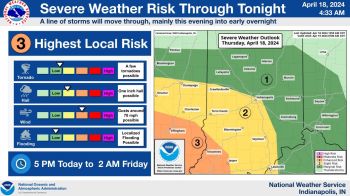WASHINGTON — Rewarding farmers for using best practices to take care of the environment is the goal of a bipartisan bill being pushed by Sen. Mike Braun.
The Growing Climate Solutions Act would allow farmers better avenues to take part in the carbon markets so they can be rewarded for using “climate-smart” practices in their farming. Indiana farmer Brent Bible testified before the Senate Agriculture Committee, on which Sen. Braun sits, Thursday.
“As a first-generation farmer I see myself as a typical, but vital part of the food supply chain,” Bible said. “I also see our farm as a significant piece of the climate puzzle for the well-being of my community, state, and country.”
Bible notes that it’s hard for farmers these days to be economically sustainable while also incurring the costs of being environmentally friendly. Bible farms 5,000 acres near Lafayette where he grows corn and soybeans for the production of farming seed, ethanol, and other products.
“I have to do things on the farm today that are going to sustain that farm both environmentally and economically,” said Bible. “Certainly I have a passion for doing positive things for the environment, but I can’t do that at a cost that at a cost to me that makes me not sustainable in five to ten years.”
This is why he is pushing for Congress to allow farmers to take part in “carbon trading.” Farmers have certain standards they have to stay below when it comes to how much carbon they can emit into the air, just like many other businesses such as those in manufacturing.
Sen. Braun and Bible say the Growing Climate Solutions Act would make it so if farmers emit less than their emission standard, they could sell off that surplus of emissions they have yet to emit to other companies. Those companies could then exceed their emissions standards with that surplus without incurring a penalty from the government.
Both Bible and Braun say this is an excellent way for businesses to make money by giving them incentives to emit less carbon into the atmosphere, and that farmers can capitalize on the market just as much.













